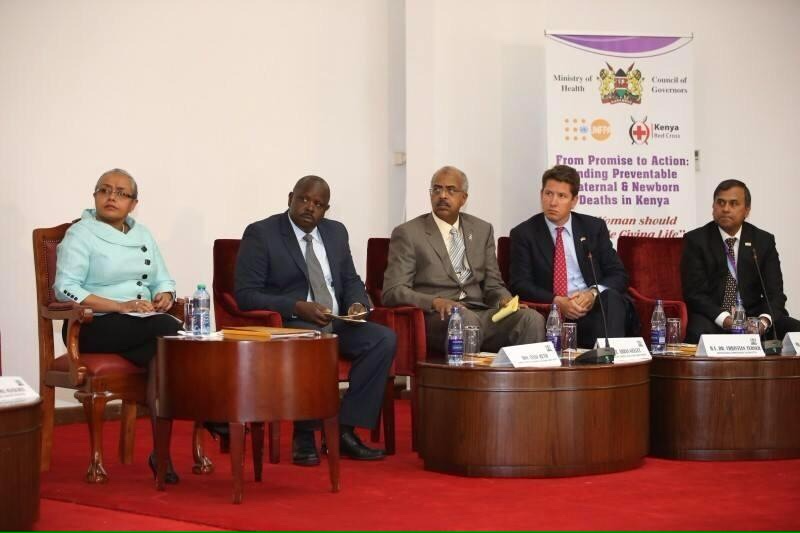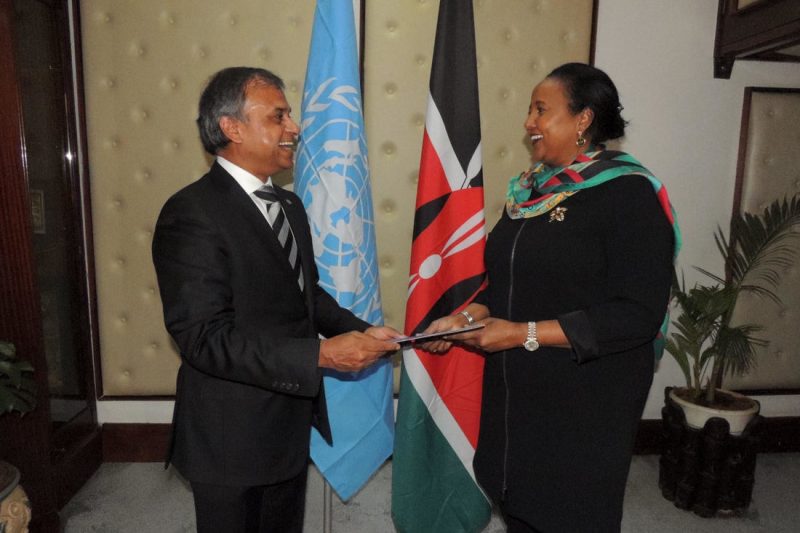He has been the United Nations Resident Coordinator in Kenya since 2016. He was previously the representative of the United Nations Population Fund (UNFPA) in Kenya where he focused mainly on gender equality & empowerment, advocating for removing obstacles that keep women from playing their rightful social and economic role in society.
Siddharth Chatterjee has previously worked in humanitarian and disaster settings with organizations such as UNICEF, UNOPS, UNFPA, UNDP as well as the International Federation of the Red Cross & Red Crescent Societies and in UN peace-keeping missions. He have also served in Bosnia and Herzegovina, Iraq, South Sudan, Indonesia, Darfur Sudan, Somalia, Denmark and Switzerland.

His early career was as an officer in a Special Forces Unit in the Indian Army, where he was decorated for gallantry by the President of India. He holds the Master’s degree from the Woodrow Wilson School of Public in International Affairs at Princeton University, USA and a Bachelor’s degree from the National Defense Academy, India.
As we speaks Chatterjee said, “we are fighting shoulder to shoulder, with the Government and people of Kenya to flatten the curve of the COVID-19 pandemic. The UN in Kenya is responding to a clarion call made by the UN Secretary General, of a UN that is “fit for purpose”, “delivering as one” and “leaving no one behind”. These are not slogans, these are real issues that the UN in Kenya is trying to do to ensure that through non pharmaceutical means we are able to end the Corona Virus pandemic in Kenya.

On being asked, ‘What inspired him to work for social issues? – From a former decorated Special Forces Officer to a humanitarian, that is an unusual career trajectory‘.
He calls it a ‘subconscious disquiet’ when he was being recognized for gallantry by the President of India. Something about the violence, the trampling of human rights, the absence of justice and the sheer velocity of force brought many questions to his mind. He saw women and children suffer the most. He is an avowed feminist and most of his social activism is based on his passion for issues that have continued to keep women on the periphery of social and economic participation. This passion has its roots in his own family background as well as the early experiences he had working in fragile duty stations with various organisations.
At an age that girls should be starting middle school, his grandmother was instead married off. Aged only eleven, she had her first baby, eventually having nine children who survived to adulthood. Hers was a lost childhood, as was that of many women and girls in India and Africa. During his service in the UN and in the Army, he saw how women bore the brunt of the worst impacts of war, as they experienced rampant sexual violence, denial of reproductive rights and forced labor. Today, he is passionate about making a difference in the lives of the most vulnerable. He have seen first-hand many human tragedies and triumphs from which he have learned important lessons and he strives to uphold human dignity. For him human dignity include access to sexual reproductive health, rights and services as well as ending maternal mortality, child marriage, FGM and other forms of discrimination and violence against women and girls.
He believes that the future of a globalized economy is female, therefore social activism on gender equality must quickly rise to the top of the global agenda. These are issues that must concern not just women and feminists, because they are also in the interests of men and boys. Gender inequality and discrimination against women harms us all. He adds, sub Saharan Africa, loses US$ 95 billion every year due to lost earnings, simply because of lack of women’s empowerment and gender inequality.

Chatterjee also talks about inequality and what are his impressions as the UN resident coordinator? He says, to a large extent, Africa missed out on most of the Millennium Development Goals. As the UN Resident Coordinator, a key indicator of success, how we perform as the UN family in support of the Government, in pursuit of the Sustainable Development Goals and in particular in realizing President Kenyatta’s Big 4 development agenda.
The demonstrations sweeping across the world today signal that, despite unprecedented progress against poverty, hunger and disease, many societies are not working as they should. Recognizing the real face of inequality is a first step; what happens next is a choice that each leader must make. This is where I see the UN can play a critical role in informing public policy. Social media has opened up space for expression by individual. It is time for everyone to speak up against the drivers of inequalities in their respective spheres of influence.

Chatterjee was asked about the youth in Africa. He said, Africa’s youth are the future. About 70% of Africa’s population is under the age of 30, which can be a challenge or a great opportunity depending on the actions governments and the youths take. Never has there been such weighty responsibility on the shoulders of young people. It is up to them to make sure that influence is channeled correctly and directed towards issues that will make the greatest impact on their future. “I have often noted that agriculture is the most immediate means of catalyzing economic growth and employment for young people. The youth must be more enthusiastic about this sector and advocate relentlessly so that farming shifts rapidly from its present status as occupation of last resort and low productivity to one of technical dynamism and recognized opportunity. I believe the youth must rise and drive the agenda, not wait for instruction or direction from others. So all young Africans, male and female, must ask themselves what their agenda is and what they are doing to shape that agenda”, he said.
He adds, Africa needs giant innovation and technological strides if it is to lift the living standards of its citizens. It can no longer be business as usual. We must embrace disruptive innovation across the development landscape. This for instance means working more with the private sector to see how their businesses can generate more positive social returns. “In Kenya, such a collaboration is being incubated between the Government of Kenya, the Center for Effective Global Action (CEGA) at the University of California, Berkeley, the Rockefeller Foundation, and the United Nations. We want to see for example how new technologies such as data analytics systems can be used to improve health delivery systems.”
On COVID-19, How the UN is specifically contributing in Kenya? – He said that, the UN family in Kenya, has deployed over 80 UN staff and volunteers to bolster the Government of Kenya’s capacity to respond. The UN has procured and supplied PPE kits, testing kits masks and range of medical supplies needed by health workers. From within the UN Development Assistance Framework to Kenya, the UN has redeployed US$ 45 million from its ongoing programmes to support Kenya’s COVID 19 response. Together with the Government of Kenya and our humanitarian partners we have launched a Flash Appeal for US$ 267.5 million to meet the needs of 10 million of the most vulnerable people in Kenya.


